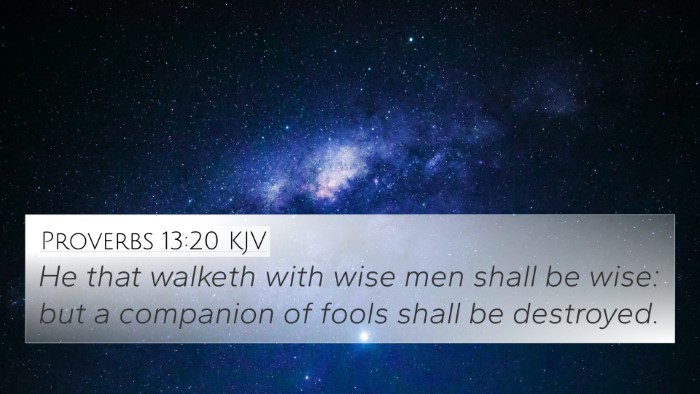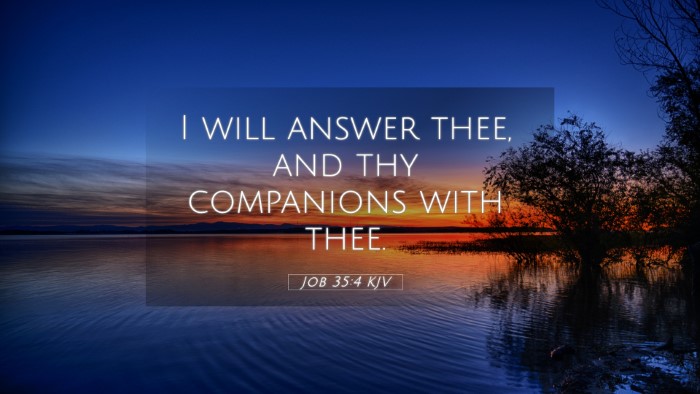Old Testament
Genesis Exodus Leviticus Numbers Deuteronomy Joshua Judges Ruth 1 Samuel 2 Samuel 1 Kings 2 Kings 1 Chronicles 2 Chronicles Ezra Nehemiah Esther Job Psalms Proverbs Ecclesiastes Song of Solomon Isaiah Jeremiah Lamentations Ezekiel Daniel Hosea Joel Amos Obadiah Jonah Micah Nahum Habakkuk Zephaniah Haggai Zechariah MalachiJob 35:4 Similar Verses
Job 35:4 Cross References
I will answer thee, and thy companions with thee.
Uncover the Rich Themes and Topics of This Bible Verse
Listed below are the Bible themes associated with Job 35:4. We invite you to explore each theme to gain deeper insights into the Scriptures.
Job 35:4 Cross Reference Verses
This section features a detailed cross-reference designed to enrich your understanding of the Scriptures. Below, you will find carefully selected verses that echo the themes and teachings related to Job 35:4 KJV. Click on any image to explore detailed analyses of related Bible verses and uncover deeper theological insights.

Proverbs 13:20 (KJV) »
He that walketh with wise men shall be wise: but a companion of fools shall be destroyed.
Job 35:4 Verse Analysis and Similar Verses
Understanding Job 35:4
Job 35:4 states: "I will answer you, and your companions with you." This verse is part of a speech made by Elihu, one of Job's friends who so far had remained silent during the debates between Job and his other friends. In this context, Elihu asserts his intention to respond to Job's earlier accusations and defend God's justice.
Commentary Insights
This verse serves as a starting point for understanding Elihu's role in the dialogues of the Book of Job. Let us examine the insights from various public domain commentaries:
- Matthew Henry emphasizes the importance of Elihu's voice. He suggests that Elihu does not merely aim to echo the sentiments of Job’s friends; rather, he takes a unique position by addressing Job and his companions directly, indicating a new perspective that contrasts their views.
- Albert Barnes highlights the confidence Elihu displays in his ability to answer the questions about God's justice. He points out that while Job questioned God’s fairness, Elihu challenges him to reconsider his understanding by presenting God's greatness and wisdom as beyond human comprehension.
- Adam Clarke notes that Elihu signifies a transition in the conversation, positioning himself as a mediator who has kept silent to gather understanding before opining. Clarke discusses how Elihu represents a more youthful and perhaps more fervent approach to discussing suffering and divine justice.
Thematic Connections
Job 35:4 relates to several important themes in scripture that can be explored through cross-referencing:
- Human Suffering: This theme is prevalent throughout the Bible, explored in verses such as Psalm 34:19, which notes that the righteous may have many troubles, but the Lord delivers them.
- The Justice of God: Elihu's assertion of God's justice can be connected to Romans 9:14, where questions of God's fairness and mercy are examined.
- The Role of Wisdom: Elihu’s wisdom in speaking on behalf of God can be compared to Proverbs 1:7, which states that the fear of the Lord is the beginning of knowledge.
- God's Sovereignty: The overarching theme of God’s sovereignty and His ways being higher than ours can be illustrated in Isaiah 55:8-9.
- Divine Communication: The concept of God communicating with humanity can be examined alongside Job 33:14-15, where God speaks to us in dreams.
- The Importance of Listening: Elihu emphasizes listening to divine revelation, akin to James 1:19 which instructs to be quick to listen.
- Judgment and Accountability: The call for accountability in one’s actions reflects the theme found in 2 Corinthians 5:10, which speaks about standing before the judgment seat of Christ.
Cross-Referencing Biblical Texts
Understanding Job 35:4 in a wider Biblical context enhances our comprehension of the interconnectedness of scriptural themes:
- Cross-reference with Job 34:10-12 focuses on God’s inherent justice.
- Link to Ecclesiastes 3:17 which addresses the evaluation of mankind's actions by God.
- Further, Acts 17:31 speaks of God adjudging the world in righteousness.
Comparative Bible Verse Analysis
In undertaking a comparative analysis, we identify parallels between similar discourses within the Book of Job and other scriptural segments:
- Job 35:4 can be contrasted with Job 13:15, where Job expresses trust in God despite his suffering.
- Compare how Psalm 73 handles the topic of the prosperity of the wicked versus the plight of the righteous, similar to the foundational arguments of Elihu.
- Reflection of Job 35:4 finds its echo in the New Testament with Matthew 5:11-12, where those persecuted for righteousness are blessed.
Tools for Bible Cross-Referencing
To delve deeper into the connections of Bible verses like Job 35:4, various methods can be employed:
- Bible Concordance: Useful for locating specific verses and understanding their context.
- Bible Cross-Reference Guide: Provides structured guidance in navigating themes across scriptures.
- Cross-Reference Bible Study: Involves methodically following links to broaden comprehension.
- Comprehensive Cross-Reference Materials: Resources compiling thematic connections for deeper study.
Conclusion
In conclusion, Job 35:4 encapsulates Elihu's readiness to present God's perspective amidst human suffering and misconceptions. The analysis of this verse not only enhances our understanding of the text itself but also opens avenues to profound thematic connections throughout the scripture. As one engages in cross-referencing, it becomes evident how interconnected the stories and principles of the Bible are, illustrating a coherent narrative that speaks to the human experience in relation to the divine.



